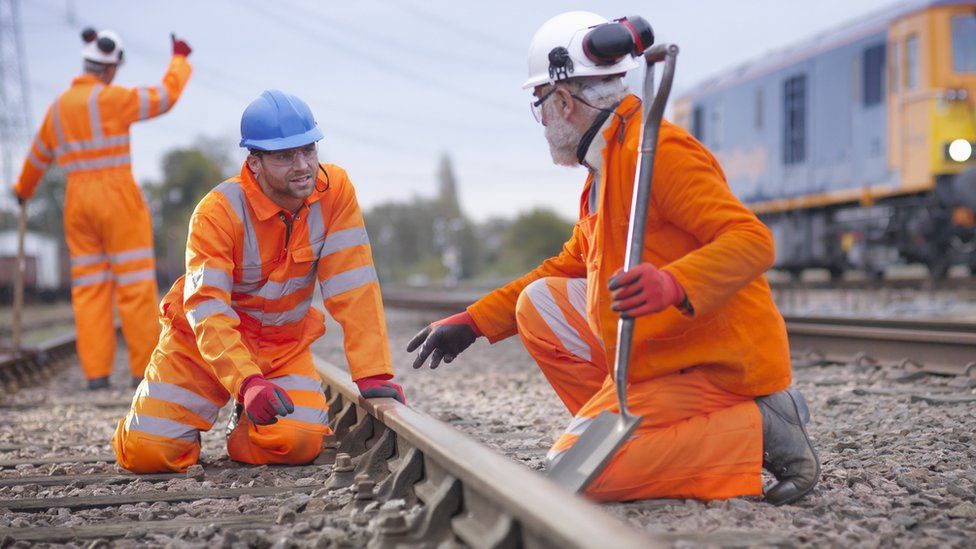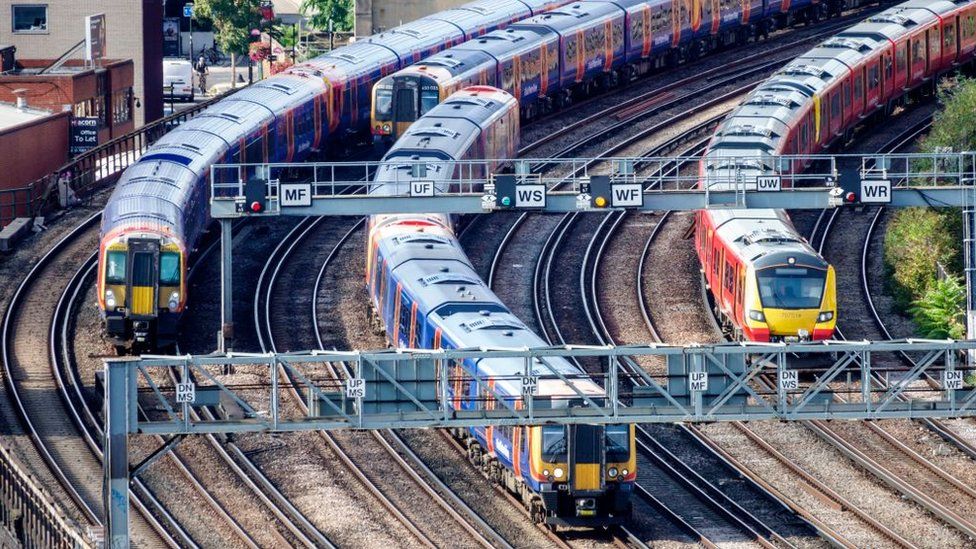UK
Rail worker strike would be 'biggest' in history, says RMTBy Simon Browning
Business reporter

A rail workers' union has said it intends to ballot more than 40,000 workers in a dispute over pay and jobs, which could trigger the "biggest rail strike in modern history".
The RMT union said Network Rail plans to cut up to 2,500 jobs as part of a £2bn reduction in spending.
The union claimed that the cuts would mean accidents were "more likely".
Network Rail said it was "disappointed" with the union's move and urged it to "work with us, not against us".
The track operator said it hadn't tabled any proposals or consultation papers and was discussing ideas.
Tim Shoveller, Network Rail's regional director, said: "We cannot keep relying on government handouts, and so we must work together with train operators and our trade unions to save millions of pounds and deliver a more efficient railway."
RMT said the proposed job cuts include workers who maintain tracks, signals and overhead lines among other things.
It also claimed train operators had been subject to pay freezes and changes to their terms and conditions.
'Safety-critical jobs'
The union's general secretary, Mick Lynch, said cutting the "safety-critical jobs" would "spell disaster for the public, make accidents more likely and will increase the possibility of trains flying off the tracks".
He warned a national rail strike would "bring the country to a standstill" but said union members' "livelihoods and passenger safety are our priorities".
The 15 train-operating companies the RMT will ballot include LNER, Chiltern, Avanti, Cross Country and South Western.
Passenger numbers on the railways are still lagging pre-pandemic levels, with working from home becoming a staple of many commuters' working patterns. This has led to passenger revenues failing to recover and income on the network stalling.
Mr Lynch said railway workers also had to contend with "pay freezes, the prospect of losing their jobs and repeated attacks on their terms and conditions".
"Train operating companies have praised our members for being key workers during the pandemic but have refused to keep staff pay in line with inflation and soaring living costs," he added.
"As a result, thousands of railway workers have seen their living standards plummet and have run out of patience."
Better rail services promised in huge shake-up
Seven ways the rail shake-up will affect you
But Network Rail's Mr Shoveller said the operator would "not consider any changes that would make the railway less safe".
"Our railway has been hit hard by the Covid-19 pandemic, and even as passenger numbers start to recover, we know travel habits and passenger demand have changed and the industry has to change too," he said.
The Rail Delivery Group, which represents train operating firms, said the focus should not be on strikes that would disrupt people's lives, but on adapting to people's new travel patterns.
It said the pandemic had an unprecedented shock on the railways, with the lowest passenger numbers in over 150 years.
"For the sake of our people and everyone who relies on our railway every day, we want the RMT to work with us to bring how we run our services up to date so that it is more reliable, more affordable and inspires more passengers back on board," it said.

The RMT responded to the trade body saying it is "always open for meaningful talks", but added it would not work with "the Rail Delivery Group or anyone else to help distribute the pain of job losses and real terms pay cuts that have nothing to do with securing a thriving railway going forward".
The government said it has spent more than £14bn propping up the railways after passenger numbers and ticket revenues collapsed during the pandemic.
The Department for Transport said it wanted a "fair deal for staff, passengers and taxpayers so the railway doesn't take money away from other essential public services like the NHS".
It said the "kind of irresponsible disruption" a strike would bring "only makes things worse, damaging our economy just as it is recovering".
It has plans to introduce a new state-owned body, Great British Railways (GBR), which will set timetables and prices, sell tickets in England and manage rail infrastructure.
GBR will replace the current track operator, Network Rail, in 2023 and the government says the new system will look more like Transport for London, with multiple operators under one brand.
The systems will differ slightly in Scotland and Wales, where transport is devolved, but GBR will still operate in those nations.
No comments:
Post a Comment